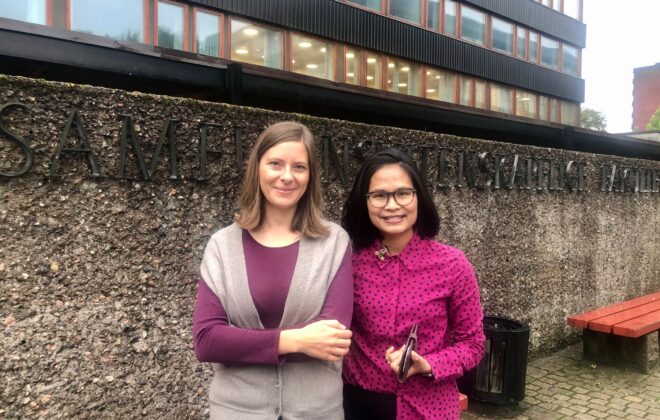Transdisciplinarity and Universities: a path ahead
This blog post was first published on KOI TU: The Centre for Informed Futures’ webpage (University of Auckland) on April 21st, 2020. It is coauthored by M. Kaiser (KOI TU International affiliate member) and P. D. Gluckman, K. Allen, A. Bardsley, T. Buklijas (KOI TU).
This paper[i] places a more extensive discussion in the context of how the University might respond.
Defining and characterising transdisciplinarity
Transdisciplinarity (TD) is here defined by its characteristic features which include:
- Ab initio commitment to the framing of the question by integrating different domains and disciplines of knowledge, even when this means working across different theoretical perspectives and methodological practices.
- A focus on real-world problems, where context and complexity are recognised and confronted as part of the methodology.
Transdisciplinarity should be distinguished from both multi-disciplinarity (MD) and interdisciplinarity (ID), and it transcends mere convergence of disciplines.[1] In contrast to TD, MD is an uncommitted collaboration between different disciplines where experts use their traditional ways of addressing problems while maintaining their respective disciplinary perspectives. ID generally works at the interface between a small number of pre-defined disciplines as a collaboration of different experts, with the aim of developing the most appropriate and singular approach, reflecting the parent disciplines. In other words, ID and MD frame the problem from their disciplinary origins and then try and work together.
Transdisciplinarity, in contrast, does not start from a disciplinary bias and is agnostic to which disciplines must be engaged. In doing so, it is open to diverse epistemological perspectives from across and beyond the social and natural sciences.[2] TD is typically called upon to address “wicked” problems.[3] It is core to the practice known as post-normal science (PNS), where an integration of human values and behavioural dimensions with the evidence base is crucial to finding acceptable pathways forward.[4]
It is important to acknowledge that this openness towards a broad range of disciplines is often seen as difficult or problematic, because the joint work of disciplines with different terminologies, and even incommensurable aims and theory is hard.
The TD approach is intended in part to overcome rather sterile and decades-old philosophical debates which have be devilled much of academia seeking to work across domains and disciplines. Typically, academics tend to be good at diagnosing problems of complex nature (e.g. sustainability issues), but are often less adept at proposing workable solutions, as defined by being effective, scalable, socially robust and with a reasonable range of spill-over effects, both positive and negative. Transdisciplinarity helps to better position academics and universities to contribute to solutions because it helps to integrate and reflect more real-world circumstances than traditionally reductive single-discipline perspectives.
Why should universities take TD more seriously?
Both the public and the policy community expect that knowledge disciplines should directly address complex issues such as societal resilience, public health and sustainability with their expertise.[5] Government has multiplied its investment in R&D in expectation of solutions to many issues, but delivering through disciplinary science has remained relatively disappointing, in part because continued reductionist approaches often do not deal well with issues such as scalability, acceptability and societal responses and thus translation to impacts. Impactful knowledge on most of the issues relevant to contemporary societal and environmental challenges requires transdisciplinary approaches in order to move beyond just diagnosing problems, and to produce better embedded outcomes with a realistic chance of more impact on public and policy understandings and solutions.
Yet, systems of training, reward and funding (internal and external to the university) work against TD. In part this is a consequence of university organization and incentives; in part it is created by the way the funders of universities operate: but that will not change unless academia takes the lead and demonstrates what it can do. At the moment universities, funders and government reinforce each other, in a reductionist and compartmentalized approach. Overseas, where philanthropy is more available or where universities have been more entrepreneurial in supporting university wide activity, multiple means to develop such approaches are emerging. The University of Auckland and the University of Bergen are both well placed to enter TD without a large financial investment; rather what is needed is a strategic commitment.
While Centre of Research Excellence-type initiatives are designed to promote interdisciplinarity, it is still hard to create true transdisciplinarity within these bounds. The individual incentives and merits are coined to disciplinary excellence, while societal relevance and academic collaboration skills fall outside. Further, most funding systems, especially at the project funding level, do not ask for academic TD profiles and formats, while they do expect high societal impact. That fact, combined with the siloed nature of academia, prevents students and academia from being exposed to TD scholarship. Yet, paradoxically as initiatives such as the Wellbeing budget in NZ or sustainability more broadly show, transdisciplinarity is critical to many sectors. It is likely thus that TD will eventually grow as much from teaching and graduate studies as from external funding.
Parenthetically it could be argued that the failure of universities to effectively engage in many of these issues in a policy and industry-relevant way, has started to have negative impacts on universities.
The public policy community has begun to frame universities primarily as centres of vocational training and a source of ‘innovation’ (generally with a narrow economic lens), neglecting the cultural work and the broader societal function of the traditional Humboldtian university model. Consequently, the case for continued growth of public investment in universities as broad knowledge engines becomes more difficult to make. Indeed, within this “new public management” framing, universities have become even more discipline-orientated and granular in their training and outputs. But it is the Universities’ own performance incentives that have played an even greater role in effectively discouraging TD and related innovation.
What could universities do?
First, they must look to their own management systems and stop misusing metrics and structures that discourage TD and other forms of cross-disciplinary activity. To the contrary, universities need to find ways to encourage ID, MD and particularly TD by creating the conditions and incentives to support and sustain it.
They should recognize that all undergraduate training should expose students to a broad range of epistemologies and corresponding methodologies: comparing, contrasting and critiquing these. For example, all science students require knowledge of ethics, philosophy of science, and how science interrelates with society (systemically and historically). Likewise, all humanities students need to understand the processes of science, have basic science literacy, understand some core concepts and assumptions (e.g. statistics, evolution, sustainability). One further possibility would be for students to have an opportunity to explore, in an elective course (across and within the University, possibly beyond), a problem that they regard as important and motivating, preferably in a team-based environment.[6]
Innovative universities taking a transdisciplinary approach would likely start taking a small cadre of high-quality students who have integrative thinking skills and training them, at the upper undergraduate level, in TD thinking. This training would likely involve problem-based teaching and project work at least in the third undergraduate year.
At the graduate level, higher degrees in TD should be supported. However, transdisciplinary graduate training requires university-wide centres/institutes (which are not faculty-led, except perhaps for administrative organisation) with TD skills to define projects and develop and, where necessary, find and mentor supervisors across the University suitable to provide TD training. This cannot be done unless there are university-wide policies encouraging faculties to collaborate on such matters, and administrative systems including finances designed to assist administratively.
This activity is quite distinct from that of regular postgraduate activity. Students undertaking TD degrees require ongoing mentorship and coursework quite distinctive from that of a standard PhD/Masters student. They need engagement with different types of seminars and discussion, exposure to policy makers, exposure to PNS thinking, and a constant focus on TD framing throughout their training. The faculty involved themselves must have a commitment to TD at least as part of their research activities. Again, this innovation requires a central centre/unit of true TD expertise to assess quality and to work with faculty to achieve these goals.
This type of committed and sustained mentorship is especially important in an international academic environment that still rewards on the basis of discipline-bound merit.
It is important to note TD is as much (if not more) about training as it is about research. TD teaching is distinctive in how it is conducted as it needs to be largely problem-based. Exploiting TD as a research tool alone will limit its impact on behalf of the University and disadvantage any graduate students involved. A group, such as Koi Tū in Auckland and the SVT in Bergen could be its nidus, but it will only thrive if there is a solid and committed teaching base, especially at the graduate level. Where TD has been developed at universities, it usually starts with such a centre and evolves from modification to current degrees (e.g. BA, BSc) to providing a route to graduate studies. These programmes must be distinct – otherwise they quickly slide back to a disciplinary focus.
A strategy some Universities have used (e.g. University of British Columbia) is to have an internal competition for a few faculty members each year to be seconded to such a centre to gain experience in TD thinking and application. These have been seen as highly prestigious awards. At the more advanced level, centres such as the Santa Fe Institute demonstrate the prestige that can be gained.
What is the benefit to the University of moving to greater commitment to TD?
A central benefit to the whole university is that TD creates a genuine forum through which to gain deeper and more well-rounded appreciation of problems and their solutions, which in turn will make (conventional) teaching and research more informed and effective. TD training for graduate students should therefore be a pinnacle programme for a research university, provided selection is based on both grades and interview.
Career pathways for such students exist. Evidence from offshore shows that such programmes are highly popular with good students (who increasingly want their studies to be personally meaningful) and lead to career opportunities in both the public and private sector. They also equip the graduate with the ability be able to cope with the multiple changes in skill set and focus, likely across their lifetime.
A further benefit will be that civil society and policy makers will see the societal role of the University in a fresher light. In essence, TD represents a kind of “re-enlightenment” through re-engagement and alignment with the core aspects of a research university as it emerged 200 years ago, and which have been somewhat lost since the mid-20th century. TD will make the University much more relevant to the impact agenda that policy makers have unequivocally set – for example in human development, in sustainability, in environmental management or in societal resilience.
The Covid-19 pandemic is leading to major changes in many parts of society; higher education will certainly be affected. Deep thinking and new approaches will be needed. A refocus for some aspects of higher education creates an opportunity for universities such as Auckland and Bergen to improve their performance, and to become world leaders of a revised university model that meets our new big societal challenges.
What the University of Auckland might do?
An underlying restriction is the lack of a process for joint appointments across departments and faculties in the University. In many universities cross-appointments are normal and encouraged and the lack of them is a strong signal in favour of siloed teaching.
Koi Tū has a staff with global credibility in TD research and training. They could act to coordinate discussions towards an action plan. They have experience in producing case-based teaching material which has been applied around the world at levels from undergraduate to senior policy makers with a TD focus. Their backgrounds and relationships span the major faculties of the University (including Medicine, Engineering, Arts, Business and Science). It may be that they should be tasked to establish a university wide group to develop and even pilot a TD strategy.
There is a need to establish of postgraduate (masters and doctoral) training in TD – students are seeking such training. The issue of PhD supervision and the location of doctoral degrees awarded in transdisciplinarity needs to be addressed. It would be ironic for a student who wishes to be trained in transdisciplinarity to receive a doctorate in a narrow discipline.
A further step might be to build off current undergraduate options in Science, Arts and Engineering with course content developed and provided by Koi Tū in partnership with others at an upper undergraduate or honours level.
At the same time, the administration should consider how incentives might be reoriented to support such activities.
Read the original post with references here.
Featured image: Unsplash

Matthias Kaiser
Tags In
Related Posts
2 Comments
Comments are closed.





That is the proper blog for anybody who needs to search out out about this topic. You notice a lot its almost arduous to argue with you (not that I really would need…HaHa). You positively put a new spin on a topic thats been written about for years. Nice stuff, simply great! Popular Free Webmaster
Excellent post. Thanks pertaining to sharing these details. It’s really of great be an aid to me. From a person’s article, I know extra in this particular respect. I may continue paying attention to your write-up.